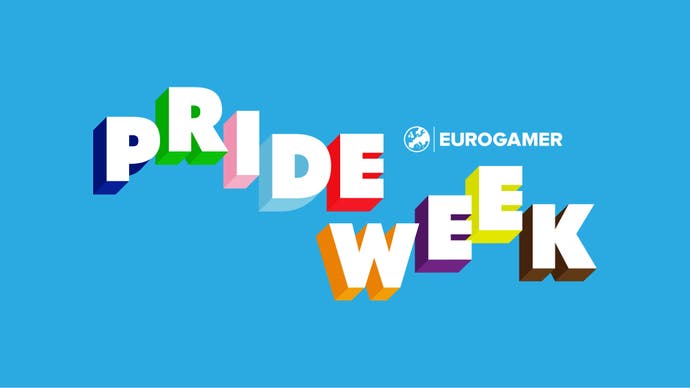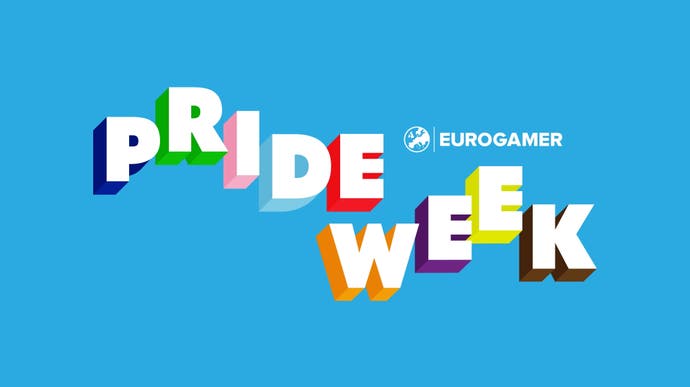Pride Week: Seven important lessons toward greater LGBT+ inclusivity
Where next for games?
Hello! All this week we've been celebrating Pride and the power of positive representations in games. Every day we've been bringing you stories and insights from different parts of the LGBT+ community, and if you've missed any of our previous Pride Week features, you'll find a full list below. You can also help support Pride with Eurogamer's newly redesigned t-shirt - all profits from which will be going to charity.
I've dedicated half a decade to diversity and inclusion in games. I am the managing director of Queerly Represent Me (a charity focused on improving representation in games and the industry), I'm co-chair of the IGDA LGBTQ+ SIG, I'm an ambassador for inclusion initiatives as part of my role at Sledgehammer Games, and I have written more articles and given more talks on this topic than I can even count anymore.
I have studied many forms of marginalisation because to work in diversity requires us to think intersectionally, but I started out looking at representations of queerness. Because of this (as well as my own bisexuality), Pride Month holds a special place in my heart.
Dedicate five years to anything and you'll learn a thing or two. I've been documenting my experiences while watching universities, indie developers, and AAA studios approach diversity in vastly different ways, and have also conducted a bunch of my own research. Here are some of the most important lessons I've learned.

People use the same words but mean different things.
'Diversity' is a term that has been used in games for so long now that it's completely lost its meaning. Two people can be talking about diversity in games but actually be having two entirely different conversations. There are many words with similar baggage-like 'marginalised', 'representation', or 'queer'.
If we are going to make progress, we need to get better at asking what other people actually mean. For example, if somebody says they're worried about diversity in games, they may actually mean that they are worried about inauthentic characters being included in narratives just because of their social identities because this would make narratives less engaging. That is a completely valid fear-and nobody is asking for tokenistic characters! Properly understanding one another helps us establish shared goals and work towards them together.
Audiences want creators to make the games they want to make.
Our research has shown that, more than anything, audiences want creators to make the games they want to make. But audiences can sometimes convince themselves that creators are being 'forced' to make particular decisions-either by publishers, other players, or the 'social justice warriors'.
Most games are made by more than one person, and those people have different wants and needs. Developers have to keep stakeholders like publishers and players in mind as well. But that doesn't mean anyone is making a game that they don't want to make. If particular characters and stories are being included in games, it's not because developers were forced to put them there.
...but audiences don't think visual novels or text-based adventures are 'real games'.
Oh, yeah, developers can make whatever they want unless what they want to make are visual novels or text-based adventures. The majority of people we've surveyed still think that 'casual' games are not 'real' games. But we need to be careful about discounting whole genres, especially when those genres are the places we are most likely to see queer characters in games.
Not only are visual novels and interactive narratives real games, but they're also really important games. They are experimenting with story and engaging with diverse characters in a way that shows other creators what can be possible.
Developers need to consult early and often.
Diversity consultants need to be hired on projects early, and continue to engage with projects throughout. There are hundreds of people working on diversity consultation, and we all have different areas of expertise. Some might focus on character representations, while others might focus on physical accessibility. There are a lot of factors to consider, so it's unreasonable to expect developers to always keep them all in mind while also trying to figure out how to resolve a complex story arc or create good game feel. That's where consultants come in!
It's difficult-and in many cases, impossible-to edit in diversity and accessibility towards the end of a project. You can't just turn a character into a lesbian at the last minute and expect that to feel embedded into the story. But involving consultants early helps creators start off with diverse characters and narratives, while avoiding common pitfalls. Then you can spend the entire development cycle making sure these representations are authentic, not tokenistic.
...but marginalised people do not exist to educate you.
Consultancy is important, but that doesn't mean you should DM any queer developer you know for their opinion or pick up the phone and call that neighbour you're pretty sure is gay. People who work as diversity consultants have chosen this field and have specific expertise.
There's more to being a consultant than just having a particular identity. Diversity work is real work, and it's seriously underpaid. This is a huge problem because marginalised people are statistically already underpaid compared to more privileged groups. Don't perpetuate the problem by expecting diversity work to be a 'favour'. Always pay your consultants!
There needs to be quality and quantity for representation to be effective.
One authentic representation in one awesome game is not going to solve the problem of diversity in the games industry. We need quality representations en masse across the industry. When there's a larger number of representations, one less-than-perfect attempt becomes less significant and one stereotypical character stops being the only option.
But nobody is asking for diverse characters to replace straight white-skinned brunette cis men with a little stubble on their chins. The games people know and love will still exist; we just want there to be other options too.
Representation is improving.
Sometimes it feels like we aren't making any progress or - worse - like we're going backwards. But overall things are slowly getting better. The Queerly Represent Me database, currently lists 1,675 games with queer themes released across 35 years, and 300 of those were released in the past three. That's huge! We're also seeing LGBTQ+ characters appear in more big-budget AAA games, which are being played by larger audiences. People are supporting diverse representation more loudly, and it's starting to drown out the vocal minority who are scared of change.
There is still so much work to do, but we can make a difference if we do it together.
Further reading:
- Read more from Alayna Cole on Twitter
- Queerly Represent Me
- Cooperative Gaming (book)
And if you missed any of Eurogamer's previous articles for Pride Week, you can read them here:
- Final Fantasy 7 - the perfect queer epic for Pride in lockdown
- LGBT+ streamers and the importance of communities
- Life is queer
- Towards more speculative sex - Or "why sci-fi fucking needs to get weirder and how games are paving the way"
- Witnessing the rise of LGBT+ representation - My search for LGBT+ voices in games
- Down and out in Orgrimmar and London - The continuing importance of LGBT+ spaces in gaming









